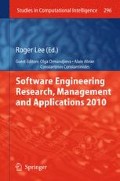Abstract
Software project estimates are more useful when made early in the project life cycle: this implies that these estimates are to be made in a highly uncertain environment with information that is vague and incomplete.
To tackle these challenges in practice, the estimation method most used at this early stage is the Expert Judgment Estimation approach. However, there are a number of problems with it, such as the fact that the expertise is specific to the people and not to the organization, and the fact that this intuitive estimation expertise is neither well described nor well understood; in addition, the expertise is difficult to assess and cannot be replicated systematically.
Estimation of Projects in Contexts of Uncertainty (EPCU) is an estimation method based on fuzzy logic that mimics the way experts make estimates. This paper describes the experiment designed and carried out to compare the performance of the EPCU model against the Expert Judgment Estimation approach using data from industry projects.
Access this chapter
Tax calculation will be finalised at checkout
Purchases are for personal use only
Preview
Unable to display preview. Download preview PDF.
References
Bourque, P., Oligny, S., Abran, A., Fournier, B.: Developing Project Duration Models in Software Engineering. Journal of Computer Science and Technology 22, 348–357 (2007)
Project Management Institute, PMBOK Guide – A Guide to the Project Management Body of Knowledge, 3rd edn., p. 378 (2004)
Idri, A., Abran, A., Khosgoftaar, T.M.: Fuzzy Analogy: A New Approach for Software Cost Estimation. In: International Workshop on Software Measurement (IWSM 2001), Montréal, Québec (2001)
Idri, A., Abran, A., Khoshgoftaar, T.M., Robert, S.: Estimating Software Project Effort by Analogy Based on Linguistic Values. In: 8th IEEE International Software Metrics Symposium, Ottawa, Ontario (2002)
Boehm, B.W.: Software Engineering Economics. Prentice Hall, Englewood Cliffs (1985)
International Function Point User Group, http://www.ifpug.org/
Ribu, Kirsten: Estimating Object-Oriented Software Projects with Use Cases, MSc thesis, University of Oslo, Department of Informatics (November 2001)
Myrtveit, E.S.: A Controlled Experiment to Assess the Benefits of Estimating with Analogy and regression Models. IEEE Transaction on Software Engineering 25(4), 510–525 (1999)
Shepperd, M., Schofield, C., Kitchenham, B.: Effort Estimation Using Analogy. In: ICSE-18, Berlin, pp. 170–178 (1996)
Idri, A., Abran, A., Khoshgoftaar, T., Robert, S.: Fuzzy Case-Based Reasoning Models for Software Cost Estimation. In: Soft Computing in Software Engineering: Studies in Fuzziness and Soft Computing. Springer, Heidelberg (2004)
Kolodner, J.L.: Case-Based Reasoning. Morgan Kaufmann, San Francisco (1993)
Kacprzyk, J., Yager, R.R.: Emergency-oriented expert systems: a fuzzy approach. Information Sciences 37(1-3), 143–155 (1985); Referenced in [13]
Azadeh, A., et al.: Design and implementation of a fuzzy expert system for perform-ance assessment of an integrated health, safety, environment (HSE) and ergonomics system: The case of a gas refinery. Inform. Sci. (2008), doi:10.1016/j.ins.2008.06.026
Idri, A., Abran, A.: Towards A Fuzzy Logic Based Measures for Software Projects Similarity. In: 6th MCSEAI 2000 – Maghrebian Conference on Computer Sciences, Fez, Morocco (2000)
Shepperd, M., Schofield, C.: Estimating Software Project Effort Using Analogies. In: ICSE-18, Berlin, pp. 170–178 (1996)
Souto, F.V., Abran, A.: Industry Case Studies of Estimation Models Using Fuzzy Sets. In: International Workshop on Software Measurement – IWSM-Mensura 2007, Palma de Mallorca (Spain), November 5-8, pp. 1–15 (2007)
Kadoda, G.M., Cartwright, L.C., Shepperd, M.: Experiences Using Case-Based Reasoning to Predict Software Project Effort, EASE, Keele, UK (2000)
Jeffery, R., Ruhe, M., Wieczorek, I.: Using public domain metrics to estimate software development effort. In: Seventh International Symposium on Software Metrics 2001, UK, pp. 16–27 (2001)
IEEE Standard Glossary of Software Engineering Terminology, IEEE std. 610.12-1990 (1990)
Condori-Fernandez, N., Pastor, O., Abran, A., Sellami, A.: Introduciendo Concep-tos de Metrologia en el Diseno de Medidas de Software. In: XI Iberamerico Workshop on Requirements Engineering and Environments, IDEAS 2008, Pernambuco, Brazil, pp. 112–125 (2008)
The Standish Group International, Extreme Chaos, The Standish Group International, Inc., Research Reports (2000-2004), http://www.standishgroup.com
The Buzz, Off Base: Insufficient expertise in setting baselines hits U.S federal IT budgets where it hurts. PM Network, 21 (March 2007)
Zadeh, L.A.: Is there a need for fuzzy logic? Information Sciences 178(13), 2751–2779 (2008)
Idri, A., Kjiri, L., Abran, A.: COCOMO Cost Model Using Fuzzy Logic. In: 7th International Conference on Fuzzy Theory &Technology, Atlantic City, New Jersey (2000)
IFPUG, Function Point Counting Practices Manual, Version 4.2.1, International Function Points Users Group (2005)
Zadeh, L.A.: Is there a need for fuzzy logic? In: Fuzzy Information Processing Society, NAFIPS 2008. Annual Meeting of the North American, May 19-22 (2008)
Roychowdhury, S., Wang, B.-H.: Measuring inconsistency in fuzzy rules. In: Fuzzy Systems Proceedings, IEEE World Congress on Computational Intelligence, May 4-9, vol. 2, pp. 1020–1025 (1998)
ISO, International Vocabulary of Basic and General Terms in Metrology, International Organization for Standardization, Switzerland, 2nd edn. (1993), ISBN 92-67-01075-1
Steve, M.: Software Estimation: Demystifying the Black Art. Microsoft Press (2006)
Abran, A.: Estimation and Quality Models Based on Functional Size with COSMIC – ISO 19761. Draft, ch.6 (April 2008)
Author information
Authors and Affiliations
Editor information
Editors and Affiliations
Rights and permissions
Copyright information
© 2010 Springer-Verlag Berlin Heidelberg
About this chapter
Cite this chapter
Valdés, F., Abran, A. (2010). Comparing the Estimation Performance of the EPCU Model with the Expert Judgment Estimation Approach Using Data from Industry. In: Lee, R., Ormandjieva, O., Abran, A., Constantinides, C. (eds) Software Engineering Research, Management and Applications 2010. Studies in Computational Intelligence, vol 296. Springer, Berlin, Heidelberg. https://doi.org/10.1007/978-3-642-13273-5_15
Download citation
DOI: https://doi.org/10.1007/978-3-642-13273-5_15
Publisher Name: Springer, Berlin, Heidelberg
Print ISBN: 978-3-642-13272-8
Online ISBN: 978-3-642-13273-5
eBook Packages: EngineeringEngineering (R0)

